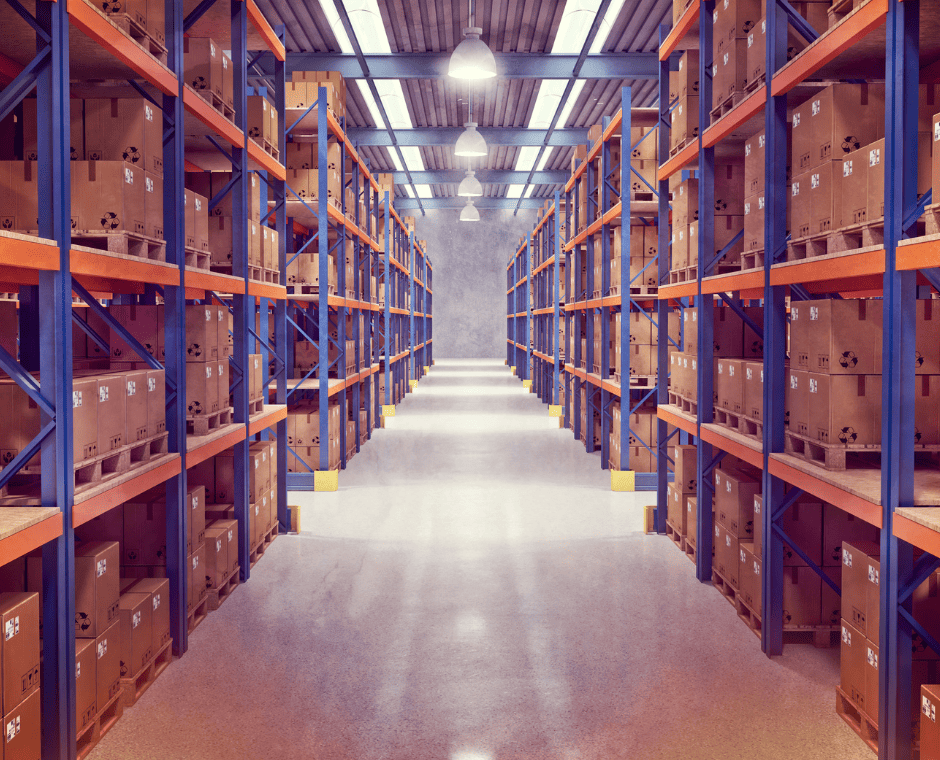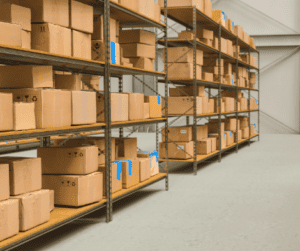How to Optimize Warehouse Storage for Profit
- September 22, 2025
- Commercial
Warehousing and storage solutions are often the backbone of successful logistics and moving companies. However, for many small businesses and property…
Read More
As a small business owner, one of the biggest challenges is finding ways to accommodate rapid growth and expansion. It’s the “good” kind of problem to have, but it can result in crowded office spaces, overflowing inventory rooms, and strained budgets. Self-storage offers an affordable and flexible solution to help small businesses optimize their workspace and operations during key transitions and growth periods.
Many entrepreneurs start their businesses out of their homes or small shared offices, which work fine at first. But scaling up a company quickly requires expanded facilities, and most traditional office or warehouse spaces require long-term leases with higher fixed costs. This can limit small business owners who want to remain nimble and scale up or down as needed. Self-storage provides an accessible option with much lower monthly costs and greater flexibility.
By utilizing self-storage units, small companies can free up room in their main workspace to better accommodate staff and operations. Excess furniture, equipment, and inventory can be safely stored nearby and accessed conveniently when needed. The scalable monthly costs also help keep overhead low. Business owners only pay for the storage space they currently need, with the ability to easily add or downsize units in the future.
In addition to flexibility, self-storage offers small growing companies security, accessibility, and optimization. By understanding how to effectively leverage self-storage solutions, entrepreneurs can maximize their main workspaces while safely storing other business assets offsite as needed. This allows small companies to focus on optimizing daily operations and continuing to profitably scale up.
Using self-storage units for your growing business can offer many advantages over keeping everything in your office or warehouse space. Some key benefits include:
– Free up crowded office/warehouse space: Storage units allow you to remove excess inventory, equipment, furniture and files from your main premises so your staff has room to work efficiently as your company expands. According to Secure Your Reliable Business Self Storage Solutions, self-storage gives you an affordable way to clear space for operations, without having to move to a larger (and likely more expensive) location.
– Safely store inventory, equipment, documents: Sensitive business records, equipment and inventory can be kept secure in storage units with features like climate control and advanced security. You gain peace of mind knowing your valuable assets are protected.
– Easy to scale up or down as needed: Storage allows flexibility to increase or decrease capacity as your business fluctuates. You can upgrade to larger units or reduce excess storage easily, only paying for what you need.
– Convenient 24/7 access: Most facilities allow round-the-clock access. You can retrieve or restock inventory when needed, rather than having limited hours like a warehouse. Units function like an on-demand warehouse.
– Security features to protect assets: Modern storage facilities offer security cameras, coded access gates, individual door alarms and more. You can rest assured your equipment, documents and inventory are safe.

Self-storage facilities offer a variety of unit types to accommodate the needs of different businesses. Some key types of storage units to consider are:
Temperature controlled units maintain a consistent cool, dry environment between 55-80 degrees Fahrenheit throughout the year. They are ideal for businesses storing items that are sensitive to humidity, heat, or cold such as electronics, files/documents, artwork, wine, etc. Temperature control helps prevent mold, pests, and deterioration.
Some units provide grounded electrical outlets, allowing you to plug in lights, chargers, power tools, and other equipment. Electricity availability enables businesses to actively use their unit like a workspace or for charging batteries. It accommodates businesses that need lighting, power, or climate control.
Drive-up access units have large roll-up doors that can accommodate a vehicle, forklift, or pallet jack for loading and unloading inventory or materials directly from a truck or van. They are most suitable for retailers, distributors, manufacturers, or other businesses storing large volumes of products, pallets, or heavy equipment.
Storage facilities offer a range of unit sizes, starting from 5×5 feet up to 10×30 feet spaces and larger. Optimal sizing depends on your inventory volumes and access needs. It’s recommended to estimate your current inventory and projected growth to determine adequate square footage.

When choosing a self-storage facility for your business, look for the following key features:
Prioritizing these key features will help you select a high-quality, secure and accessible storage facility tailored to business needs.
Once you’ve settled on the right storage facility and unit size for your business, the next step is organizing everything you plan to store. Having an efficient system for arranging your unit can save you time and hassle each time you need to access items. Here are some key tips for optimizing your storage unit:
Create a detailed inventory labeling system. Clearly label every box and shelf with a description of contents and the date it was stored. Place labels on multiple sides so they are visible no matter how boxes are stacked. Use a consistent naming convention (e.g. number system or category prefixes). Maintain a master list of all inventory stored for easy reference. You can find printable storage unit inventory sheets and label templates online.
Invest in shelving, racks and storage bins to take advantage of vertical space. Sturdy industrial shelving units allow organizing items while keeping them easily accessible. Mounted wall racks are great for storing long items like ladders and pipes securely. Clear plastic bins are ideal for sorting smaller items while still being able to identify contents.
Categorize items by frequency of use. Set up your unit so most frequently accessed items are closest to the door. Place infrequently used items toward the back or on higher shelves. Store any items you need to access after business hours in easy reach areas to avoid fumbling around in the dark.

When budgeting for business storage, there are a few key costs to take into account:
The main recurring cost of storage units for businesses is the monthly rental fee. This varies based on factors like:
Shop around and compare rates across multiple facilities to find the best price for your needs. Many offer first month discounts for new customers.
In addition to monthly rent, most storage facilities require:
Factor these costs in when budgeting your total expenses. Some self-storage companies waive fees for the first month.
Unless your inventory fits in a small car, you’ll likely need to rent a truck or moving service to transport items to the unit. This could cost anywhere from $50 for a short-distance move to several hundred dollars for a long-distance relocation.
Compare rates from national rental truck companies like U-Haul or Penske as well as local moving companies. If budget allows, hiring professional movers may be worthwhile to safely transport delicate inventory or large equipment.

Business storage differs from personal storage in several ways.
One difference is that business storage expenses may be tax deductible. The IRS allows businesses to deduct ordinary and necessary storage expenses as a business expense. Personal storage costs are not deductible.
Business storage units also tend to have more frequent access than personal units. Employees may need to retrieve work documents or inventory from storage on a daily or weekly basis. Personal storage access is often less frequent, like once a month.
Businesses usually have stricter climate control needs as well to protect equipment, documents, and inventory. They may require climate-controlled units to prevent damage. Personal items are often more durable.
Lastly, businesses often store more sensitive assets and proprietary information. They require tighter security features like surveillance cameras and coded entry to prevent theft and unauthorized access.
When first looking into using self storage units for your growing business, there are some key steps to take in order to find the right solution:
First, accurately assess both your current storage needs, as well as what you anticipate needing in the near future. Take measurements of the items you intend to store and factor in any inventory, equipment, or supplies you foresee requiring more space for. This will help determine what size unit you require.
Next, look for facilities that are conveniently located close to your workplace. Having a storage unit nearby makes it easy for staff to access when needed. Be sure to factor in adequate proximity when comparing different facilities.
You’ll also want to compare multiple storage facilities in your local area to find the best match based on your business needs, budget and location. Reputable chains like Public Storage, CubeSmart and Extra Space Storage are good nationwide options to consider.
When touring a facility, pay close attention to the lease terms and get clarification on any confusing legal language. Understand fee increases, cancellation policies, and insurance requirements before signing an agreement. You want to avoid getting locked into an unsuitable long-term contract.
Lastly, look for storage facilities offering move-in discounts and special offers. Taking advantage of these can help reduce your overall costs, especially when first getting started with storage for your business. Be sure to inquire about any current promotions they may be running.

Utilizing self-storage is an easy and flexible way for growing businesses to optimize their space and operations. Here are some key takeaways:
With the right planning, self-storage can provide optimization and flexibility even as your business changes and expands over time.
If you’re considering utilizing self-storage for your growing business, here are some recommended next steps to take:
Contact local facilities for pricing and availability – Reach out to a few top-rated facilities near your workplace. Explain your business storage needs and inquire about available unit sizes and current rates. Get an estimate for monthly costs.
Audit and assess current storage needs – Do a walkthrough of your office, warehouse, or other spaces currently used for storage. Make notes on what is being stored, where, and how much space it takes up. This will help determine the right storage unit size.
Research organizational systems – Look into shelf systems, bins, and labeling supplies to keep your storage unit neatly organized. Proper organization will maximize the utility of the space.
Join The Discussion